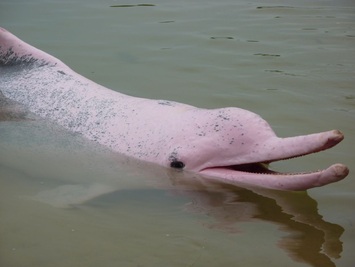 photo courtesy of electrictreehouse.com
photo courtesy of electrictreehouse.com During our trip along the Rio Napo from Coca to Iquitos our first stop was in a tiny town called Nuevo Rocafuerte, the place to find a local guide to take you on a trip into Yasuni National Park (without having to pay the crazy prices quoted by travel agencies in Coca).
Yasuni National Park
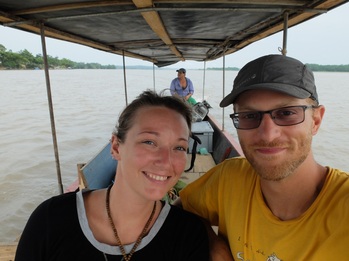 Starting our trip with Roni at the helm
Starting our trip with Roni at the helm 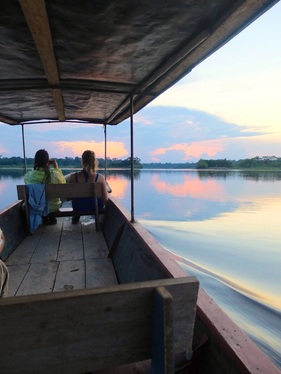 admiring the sunset from our lancha
admiring the sunset from our lancha Roni turned out to be a great guide, very enthusiastic and funny. The four of us had a blast riding in the smaller lancha (boat with outboard motor) through the Yasuni River and into a large lagoon called Jatuncocha (Quecha for "large lake"). We spent 3 days and 2 nights in the park, hiking for a few hours each day, learning about the plants and birds, watching the pink river dolphins breaching in the river (SO COOL!!), and fishing for piranhas before dark. After eating dinner and playing a couple rounds of cards (ninety-nine, or noventa y nueve en Español), we took the lancha out to do some caiman watching! We really didn’t have too much chill time, always on the go and keeping watch for some rare creatures! Mandrew had a great time snapping photos of birds as we passed by - he said it was a lot like the video game "Pokemon Snap" or something ... On the last day we did end up seeing the giant river otters, which was a great bonus!
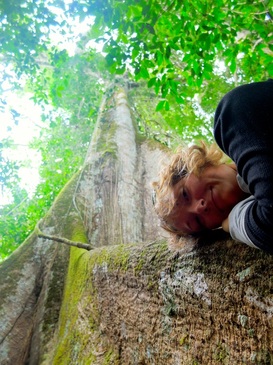 Chelsea listening to the tree spirits...
Chelsea listening to the tree spirits... Rio Aguarico - Crocodile hunting
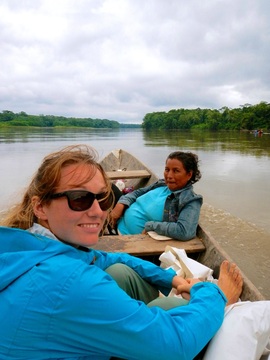 Chelsea & Lastaña in the canoa
Chelsea & Lastaña in the canoa We left Pantoja early the next morning in two canoas (dug-out canoes) heading up Rio Aguarico (a river running along the Ecuador/Peru border): Nick (U.S.), Marcos (U.K.) and Piotr (Poland) with their guide Pedro in one canoa, and us, Ernesto (Argentina) and Diana (Colombia) with our guide Lastaña and driver Filipe in the other. The ride out to our first camping spot took 6 or 7 hours upstream the Rio Aquarico through to some communal reserve land on a lagoon called Lagartuncocha (Quecha for "long lake"). The day was fun but also extremely painful on our butts! The canoas were very simple carved out tree trunks with a few planks set across to sit on. Their peke-peke motors had a small engine and a tiny prop at the end of a long pole - the drivers Filipe and Pedro had to hold onto these for the entire time to direct our boats, dodging the odd tree trunk in the river.
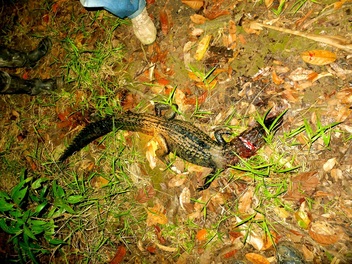 our very own jungle meat
our very own jungle meat Our boats went in separate directions, paddling only so as to sneak up on creatures. None of the passengers in our boat had much interest in actually hunting anything, but the guides didn't seem to care and proceeded to search for something to spear - I guess they were hungry. After a couple hours of failing to spear fish, Filipe set his sights on caiman, much easier to spot (at night their eyes reflect brightly and are easily spotted with a strong flashlight) and much more easily approached. Sure enough, after a couple attempts Filipe got one! It all happened so quickly – once we had approached to within a few feet of a decent-sized caiman, Filipe threw the spear in the water, struggled to grab the end as it was flailed around by the struggling beast, then he slowly pulled it up to the surface and chopped it in the head a bunch of times with a machete. At least it didn’t suffer too much. It was 4-5 feet long tail to head, pretty fair-sized.
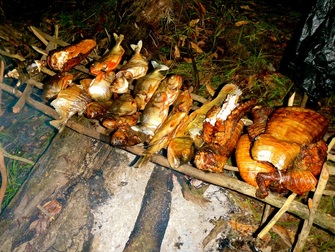 a feast for all... with some rice for Chelsea
a feast for all... with some rice for Chelsea Most of us went to bed shortly after dinner (10:00pm) and fell asleep listening to the cicadas and other birds and insects, but Nick and Piotr talked Pedro into heading back out to see if they could find the caiman that got away. They returned at 1:00am with another one altogether, smaller than ours but still with a lot of meat. At this point, for some reason, I started wondering if this was even legal. I had thought so at first because when we first arrived in Pantoja some locals let us sample some smoked caiman as a treat, and I am sure this sparked Nick’s interest in the hunting trip. But something didn’t feel quite right to me, especially since we were in a Communal Reserve. In the morning we confirmed with our guide that yes indeed, it is illegal (poaching)! Only the indigenous tribes that live further up the river are allowed to hunt and eat caiman. But that said most people still do it anyway since they are everywhere and such a great source of meat.
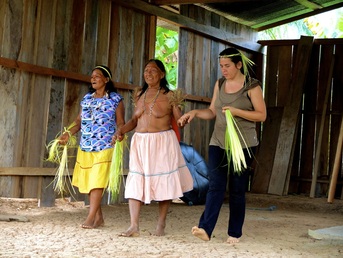 Diana learning the improvised song & dance
Diana learning the improvised song & dance They told us that the dance would take about an hour, but I have been learning to double (or quadruple) every estimate for a more accurate measure. The dance didn’t even start for an hour in this case, and when it did, it was obvious that there was no traditional dance at all and they were simply making up something and walking in a circle chatting and laughing with each other, wearing Hawaiian-type outfits but you could see the Nike swish on a few of their tops and some red paint on their faces. There didn’t seem to be anything traditional about it. And to top it off, an old man came and sat next to Nick and I which at first I thought was cool, I could ask him about some of their history or culture, but instead he just insisted that we give them more money and so on.
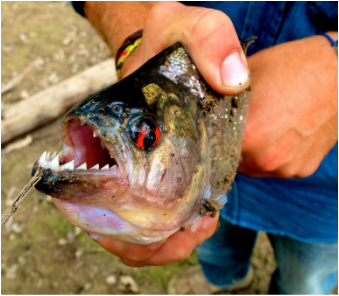 Ernesto showing off his catch
Ernesto showing off his catch Finally at 3:00 after Filipe and Pedro ate some lunch and rested for awhile (allllllways so "tranquilo" - relaxed - here), we headed back out in our boats to find a new camping spot for the night. We didn’t end up too far from our previous spot, though slightly more toward home. We set up camp again, got a fire going and cracked our bottles of agua ardiente ("burnt water", a very cheap liquor made of sugarcane). The evening was nice and relaxing, and we set up another stand over the fire to smoke Ernesto’s fish from the day. In the evening, Diana, Lastaña and I stayed at camp chatting in Spanish for a few hours while Andrew, Nick and Piotr took a canoa to explore the area again. The next morning they told us about a small caiman that they grabbed out of the water and took photos with, before letting it go again.
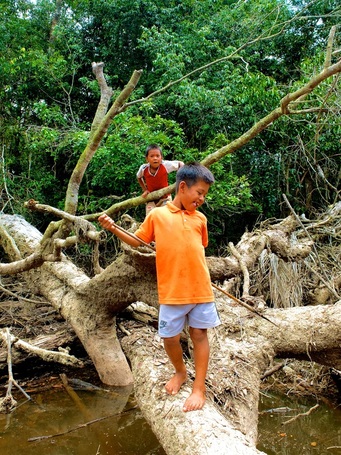 local kids honing their spear-hunting skills
local kids honing their spear-hunting skills We found a good sandy beach to dock and get a fire going for breakfast (rice, plantain and fish, plus an extra treat of pasta). Soon the other boat made its way down the river but with an extra passenger - an Ecuadorian military man was hitching a ride back to Pantoja. His main job on the river, he told us, was to catch illegal poachers and send them to jail. He proudly showed Nick some photos of a poacher bust they did a few days before where a guy had illegally hunted and ate a peccary (a wild pig, which we had also been served in Pantoja a few days earlier).
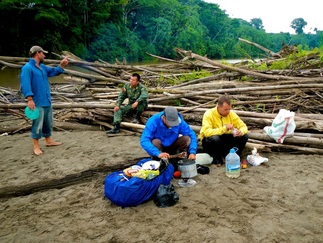 playing it cool ...
playing it cool ... Breakfast was very quick this time since we didn’t feel like spending more time than necessary with this guy. We packed up and headed out right away, hoping to make it back to Pantoja very quickly. When we got away from the other canoa with the man, I asked Lastaña what would have happened if we got caught, and she said we would all be in jail, and could be for up to eight years! PHEW! That was a close one… I could have been the only vegetarian ever to be put in jail for poaching crocodiles in South America.
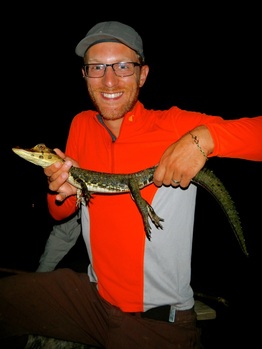 touch, but don't kill! =)
touch, but don't kill! =) After six days of fun in the jungle, a bunch of unforgettable experiences, and a few new exotic meats for Mandrew to add to his list, we're ready to continue our trip down the Rio Napo. Wish us luck!
Salud!
Chelsea


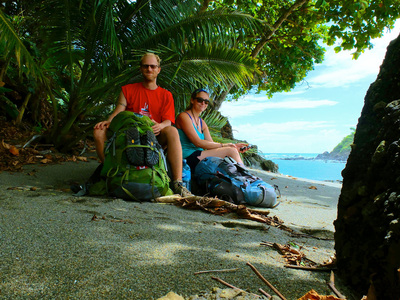
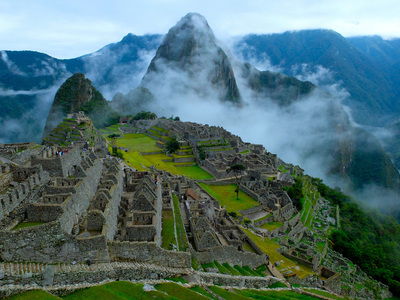
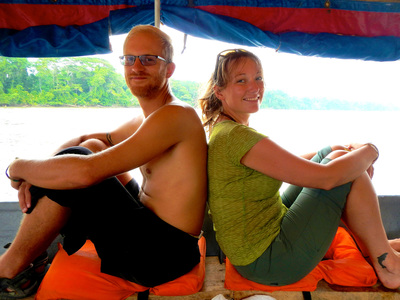
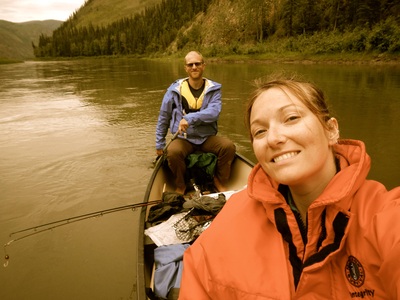
 RSS Feed
RSS Feed